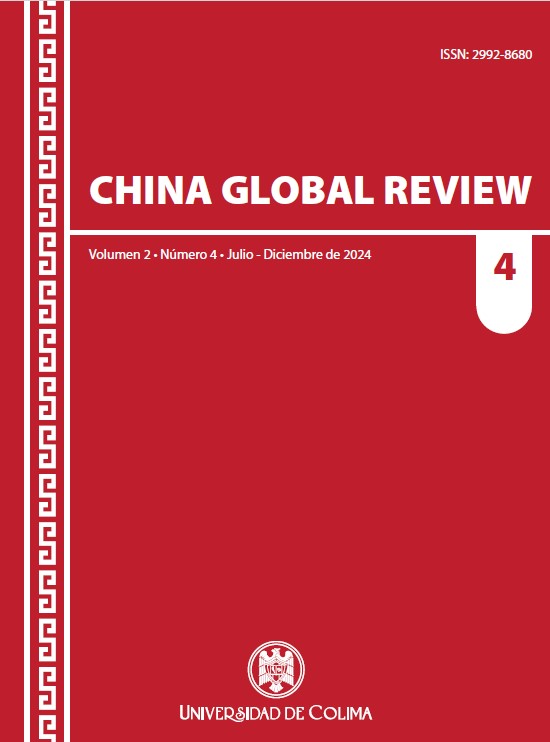Implicaciones de la cooperación internacional entre China y Laos a través de la inversión y la iniciativa BRI
DOI:
https://doi.org/10.53897/RevChinaGR.2024.04.04Palabras clave:
Cooperación internacional, Laos, China, BRI, inversiónResumen
El artículo tiene como objetivo investigar las relaciones de cooperación económica entre China y Laos, específicamente el impacto de la Iniciativa de la Franja y la Ruta en Laos, generando tanto beneficios y oportunidades, como desafíos para el desarrollo económico del país. Haciendo uso de una metodología cualitativa, en el artículo se analiza la relación bilateral entre China y Laos, específicamente bajo el contexto de la iniciativa BRI. Utilizando el caso de Laos como ejemplo, la investigación contribuye al entendimiento de los efectos de los proyectos de BRI en el mundo.
Descargas
Métricas
Citas
ASEAN (2022). Member countries. ASEAN-China Centre. http://www.asean-china-center.org/english/2010-07/09/c_13392051.htm
Asian Development Bank (2017). Lao PDR accelerating structural transformation for inclusive growth. Country Diagnostic Study. http://dx.doi.org/10.22617/TCS179052-2
Asian Development Bank (2019). Lao People’s Democratic Republic Energy Sector Assessment, Strategy, and Road Map. Asian Development Bank. November 2019. p. 2-4. https://www.adb.org/sites/default/files/institutional-document/547396/lao-pdr-energyassessment-2019.pdf
Asian Development Bank (2023). Asian Development Outlook 2023. https://www.adb.org/countries/lao-pdr/economy
Banco Mundial (2023). Base de datos del Banco Mundial. https://datos.bancomundial.org/indicador
Bradford, J. (2021). China’s Security Force Posture in Thailand, Laos, and Cambodia. United States Institute of Peace. https://www.usip.org/sites/default/files/2021-12/sr_505-chinas_security_force_posture_in_thailand_laos_and_cambodia.pdf
CIA. (2021). The World Factbook. Laos. https://www.cia.gov/the-world-factbook/countries/laos/#economy
CFE-DMHA (2021). LAO PDR Disaster Management Reference Handbook. https://reliefweb.int/sites/reliefweb.int/files/resources/disaster-mgmt-ref-hdbk-lao-pdr2021.pdf
Chaudhury, D. (2021). Laos-China Railway: Key symbol of cross-border BRI infra. The economic times. https://economictimes.indiatimes.com/news/international/world-news/laos-china-railway-key-symbol-of-cross-border-bri-infra/articleshow/88344818.cms?from=mdr
Chheang, V. & Wong, Y. (2015). Cambodia-Laos-Vietnam: Economic Reforms and Sub-regional Integration. Kyoto Sangyo University Economic Review No.1.
Comisión Nacional de Desarrollo y Reforma, Ministerio de Relaciones Exteriores y Ministerio de Comercio (2015). Perspectivas y acciones para promover la construcción conjunta de la Franja Económica a lo largo de la Ruta de la Seda y de la Ruta de la Seda Marítima del Siglo XXI. https://esp.yidaiyilu.gov.cn/document/issue/32802.htm
Di Carlo, J. (15 de marzo de 2022). Boten Special Economic Zone/Boten Beautiful Land. The People’s Map of China. https://thepeoplesmap.net/project/boten-special-economiczone-boten-beautiful-land/
Falak, A. (2021). The Completed China-Laos Railway: Bringing Opportunities for ASEAN and the Asia Pacific. ASEAN Briefing. https://www.aseanbriefing.com/news/the-completedchina-laos-railway/
Global Times (2022). China-Laos Railway marks 100 days of service, invigorating trade with ASEAN. Global Times. https://www.globaltimes.cn/page/202203/1254688.shtml
Green Finance & Development Center (2023). Investments in the Belt and Road Initiative (BRI). https://greenfdc.org/investments-in-the-belt-and-road-initiative-bri/?cookiestatechange=1695420615923
Gunn, G. (2020). LAOS IN 2019: Moving Heaven and Earth on the Mekong. Southeast Asian Affairs, 175–188. https://doi.org/10.1355/9789814881319-011
International Rivers (01 de marzo de 2021). Nam Ou River Cascade Hydropower Project. https://thepeoplesmap.net/project/nam-ou-river-cascade-hydropower-project/
Janssen, P. (2 de diciembre de 2021). $6 billion Laos-China railway on track to somewhere. Asia Times. https://asiatimes.com/2021/12/6-billion-laos-china-railway-on-tracktosomewhere/
Ku, S. C. (2015). Laos in 2014: Deepening Chinese Influence. Asian Survey, 55(1), 214-219.
https://doi.org/10.1525/as.2015.55.1.214
Kyophilavong, P., Bin, X., Vanhnala, B., Wongpit, P., Phonvisay, A. & Onphanhdala, P. (2017). The impact of Chinese FDI on economy and poverty of Lao PDR. International Journal of China Studies, 8(2), 259-276.
Lu, G. (2016). China Seeks to Improve Mekong Sub-regional Cooperation: Causes and Policies.
Rajaratnam School of International Studies. http://hdl.handle.net/11540/6512.
Nedopil, C. (2022). “Countries of the Belt and Road Initiative”; Shanghai, Green Finance & Development Center, FISF Fudan University, www.greenfdc.org
Nedopil, C. (2023). “Countries of the Belt and Road Initiative”; Shanghai, Green Finance & Development Center, FISF Fudan University, www.greenfdc.org
OECD (2018). OECD Investment Policy Reviews: Cambodia 2018, OECD Investment Policy Reviews, OECD Publishing, Paris. https://doi.org/10.1787/9789264309074en
Organización de las Naciones Unidas (2021). Construcción conjunta de la Franja y la Ruta hacia los ODS: RDP Laos.
Phimphanthavong, H. (2012). Economic Reform and Regional Development of Laos. Modern Economy. https://doi.org/10.4236/me.2012.32025
Shambaugh, D. (2020). Where great powers meet: America and China in Southeast Asia. Oxford University Press. https://doi.org/10.1093/oso/9780190914974.001.0001
St. John, R. (1997). End of the Beginning: Economic Reform in Cambodia, Laos, and Vietnam. Contemporary Southeast Asia, 19(2), 172–189. https://doi.org/10.1355/CS19_2D
St. John, R. (2006). Revolution, reform and regionalism in Southeast Asia: Cambodia, Laos and Vietnam. Routledge. https://doi.org/10.4324/9780203099476
Standard Chartered (2023). Belt and Road: One masterplan. Six economic corridors of power. https://www.sc.com/en/feature/one-masterplan-six-corridors/
Stuart-Fox, M. (1993). On the Writing of Lao History: Continuities and Discontinuities. Journal of Southeast Asian Studies, 24(1), 106–121. https://doi.org/10.1017/S0022463400001521
Stuart-Fox, M. (2009). LAOS: The Chinese Connection. Southeast Asian Affairs, 141–169. https://doi.org/10.1355/SEAA09I
Tan, D. (2012). “Small is Beautiful”: Lessons from Laos for the Study of Chinese Overseas. Journal of Current Chinese Affairs, 41(2), 61–94. https://doi.org/10.1177/186810261204100204
Tan, D. (2015). Chinese Engagement in Laos. In Chinese Engagement in Laos. ISEAS Publishing. https://doi.org/10.1355/9789814620895
Tappe, O. (2018). On the right track? The Lao People’s Democratic Republic in 2017. Southeast Asian Affairs, 169–184. https://doi.org/10.1355/9789814786843-012
Thanabouasy, P. (2021). China Remains the Largest Foreign Investor in Laos. The Laotian Times. https://laotiantimes.com/2021/08/17/china-remains-the-largest-foreign-investorinlaos-2/
The State Council Information Office of People’s Republic of China [SCIO]. (2020). What are six economic corridors under Belt and Road Initiative? http://english.scio.gov.cn/beltandroad/2020-08/04/content_76345602.htm
UNDP. (2016). NAMA for the renewable energy sector of Lao PDR. https://data.opendevelopmentmekong.net/en/library_record/nama-for-the-renewableenergy-sector-in-laos
World Bank (2022). Lao PDR Economic Monitor, Abril 2022: Unlocking the Potential of Regional Connectivity. https://thepeoplesmap.net/project/boten-special-economic-zonebotenbeautiful-land/
WTO Center (28 de julio de 2022). 2023 Foreign Investment Opportunities in Laos. https://wtocenter.vn/chuyen-de/20014-2023-foreign-investment-opportunities-in-laos
Xinhua (16 de febrero de 2019). Spotlight: BRI promotes global trade, connectivity: think tanks. https://www.xinhuanet.com/english/2019-02/16/c_137827273.htm
Xinhua (03 de agosto de 2023). Asia Album: BRI hydropower projects send bliss of development to Laos. https://english.news.cn/20230803/f2ca1307ac0d40ed95218772b03c-5ca3/c.html
Descargas
Publicado
Cómo citar
Número
Sección
Licencia
Derechos de autor 2024 Universidad de Colima

Esta obra está bajo una licencia internacional Creative Commons Atribución-NoComercial-CompartirIgual 4.0.
China Global Review permite compartir, copiar y redistribuir el material en cualquier medio o formato; adaptar, remezclar, transformar y construir sobre el material, dando crédito a la obra de manera adecuada y proporcionando un enlace a la licencia, indicando si se han realizado cambios.










